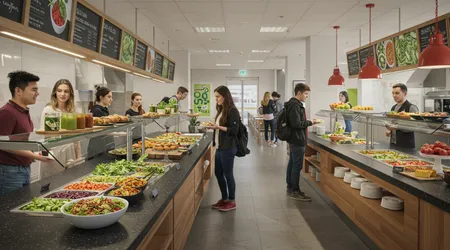Plant-Based Catering Hits UK Campuses: 13 Universities Go Vegan

Plant-Based Catering Hits UK Campuses, and it’s not just a trend it’s a seismic shift in how universities approach sustainability, health, and ethics.
In 2025, 13 UK universities, including prestigious institutions like Bristol, Imperial College London, and Cambridge, have embraced 100% plant-based catering, driven by student-led campaigns and a growing awareness of the climate crisis.
This movement reflects a broader cultural pivot, where young people demand actionable change from institutions that shape their futures.
Why should universities, hubs of innovation, lag behind in addressing the environmental toll of food systems?
This article explores the rise of vegan menus on UK campuses, their environmental and health benefits, the challenges of implementation, and what this means for the future of higher education dining.
The push for Plant-Based Catering Hits UK Campuses began with grassroots activism, notably through the Plant-Based Universities campaign, active in over 50 institutions.
Students, backed by over 650 academics, argue that universities must align their practices with their own climate research.
Animal agriculture contributes 14.5% of global greenhouse gas emissions, according to the Food and Agriculture Organization of the United Nations.
By switching to plant-based menus, campuses can slash their carbon footprint while fostering healthier, more inclusive dining options. This isn’t just about food it’s about redefining institutional responsibility in a warming world.
But this transition isn’t without hurdles. Resistance from students accustomed to meat-heavy diets and logistical challenges in scaling plant-based options raise questions about feasibility.
Yet, the momentum is undeniable, with universities like Bristol and Imperial College London voting for fully vegan menus in February 2025.
This article unpacks the why, how, and what’s next for this green revolution, offering insights into a movement that’s reshaping campus culture.
The Roots of the Movement: Why Plant-Based?
The drive for Plant-Based Catering Hits UK Campuses stems from a potent mix of science, ethics, and student activism. Animal farming consumes vast resources land, water, and energy while emitting methane, a potent greenhouse gas.
A 2018 Oxford study found that adopting plant-based diets could free up 76% of global farmland for rewilding or carbon sequestration.
Students, aware of these stakes, are pushing universities to lead by example, turning dining halls into testing grounds for sustainability.
Beyond the environment, ethical concerns fuel the movement. Younger generations, particularly Gen Z, increasingly view animal agriculture as incompatible with animal welfare.
Campaigns like Plant-Based Universities, supported by figures like Chris Packham, amplify this sentiment, framing vegan catering as a moral imperative.
For students like Agnes Sales at Bristol, it’s about graduating into a world where climate disasters aren’t the norm.
This isn’t just idealism it’s pragmatism. Universities are microcosms of society, and their catering choices signal broader cultural shifts.
++ Industry-Led Degrees: New Employer Partnerships Transform University Courses
By embracing vegan menus, they’re not only reducing emissions but also preparing students for a future where sustainable food systems are non-negotiable.
The question isn’t whether campuses should go plant-based it’s why they haven’t done so sooner.
The movement also taps into economic logic. Plant-based meals are often cheaper to produce, with ingredients like lentils and chickpeas costing less than meat.
Universities like Bristol have reported lower catering costs after pilot programs, freeing up budgets for other sustainability initiatives. This financial incentive makes the transition appealing even to skeptics.

Environmental Impact: A Game-Changer for Campuses
Switching to Plant-Based Catering Hits UK Campuses offers measurable environmental benefits. The Environmental Defence Fund notes that plant-based diets can cut food-related emissions by up to 50%.
For universities, which serve thousands of meals daily, this reduction is significant. Cambridge, for instance, aims to cut its carbon emissions by 25% by 2028, with vegan catering as a cornerstone of that goal.
Also read: Climate Education Must-Haves: Sustainability Plans in Every UK School by Sept ’25
Land use is another critical factor. A 2019 Harvard study highlighted that animal farming is the UK’s largest land consumer.
By going plant-based, campuses could indirectly support rewilding efforts, turning farmland into carbon sinks. Imagine a university’s dining hall not just feeding students but helping restore ecosystems now that’s a powerful legacy.
| Metric | Meat-Based Diet | Plant-Based Diet |
|---|---|---|
| Carbon Emissions (kg CO2e/meal) | 4.5 | 0.9 |
| Water Usage (liters/meal) | 1,250 | 300 |
| Land Use (m²/meal) | 15 | 3 |
Source: Environmental Defence Fund, 2023
This table illustrates the stark contrast between meat and plant-based meals. For a campus serving 10,000 meals daily, switching to vegan options could save millions of liters of water annually.
It’s not just about numbers it’s about creating a ripple effect that inspires other institutions.
Read more: Ofsted Inspection Overhaul: How New ‘Report Card’ Ratings Could Change Your School
Moreover, plant-based catering reduces food waste. Vegan dishes, often made from shelf-stable ingredients like grains and legumes, are less perishable than meat.
Bristol’s pilot program saw a 15% drop in food waste, proving that sustainability extends beyond emissions to operational efficiency.
Health and Wellbeing: Nourishing Minds and Bodies
Beyond the planet, Plant-Based Catering Hits UK Campuses promotes student health. Plant-based diets are linked to lower risks of heart disease, diabetes, and obesity, according to Dr. James Thompson, a nutritionist at Imperial College London.
For students navigating the stress of university life, nutrient-rich vegan meals offer a practical way to stay energized and focused.
Take Sarah, a second-year biology student at Bristol. She switched to vegan meals after her campus dining hall went plant-based and noticed improved energy levels. “I used to feel sluggish after eating,” she says. “Now, I’m alert for my afternoon lectures.”
Her story isn’t unique students report feeling better when campuses prioritize wholesome, plant-based options.
Critics argue that vegan diets lack variety or essential nutrients, but universities are debunking this myth. Leeds’ “Meatless Mondays” initiative offers dishes like chickpea korma and jackfruit tacos, proving plant-based meals can be diverse and delicious.
With dietitians on board, campuses ensure menus are balanced, addressing concerns about deficiencies like B12 or iron.
The social aspect matters too. Plant-based menus are inclusive, catering to diverse dietary needs—vegan, vegetarian, or religious restrictions like halal or kosher.
This inclusivity fosters a sense of community, making dining halls a place where everyone feels welcome.
Challenges and Resistance: Navigating the Transition
Despite the benefits, Plant-Based Catering Hits UK Campuses faces pushback. Some students crave traditional meat-based dishes, viewing vegan options as less satisfying.
At Imperial College London, a minority argued that plant-based menus limit choice, sparking debates about personal freedom versus collective responsibility. How do you balance individual preferences with planetary needs?
Logistical hurdles also loom large. Scaling plant-based catering requires retraining staff, redesigning menus, and securing reliable suppliers.
Smaller universities, with tighter budgets, may struggle to overhaul their systems. Yet, Nottingham City Council’s successful shift to vegan catering for internal meetings shows it’s achievable with commitment.
Cultural resistance is another barrier. Meat-heavy diets are deeply ingrained in UK culture, and some students see veganism as a radical departure.
Universities are countering this by offering familiar dishes think vegan shepherd’s pie or plant-based burgers that ease the transition without alienating diners.
Education is key to overcoming skepticism. Imperial’s Klimato Sustainable Food Solutions, set to launch in 2025/26, will label menus with carbon footprints, empowering students to make informed choices.
By framing veganism as a practical step rather than a moral stance, campuses are winning over doubters.
The Future of Campus Dining: A Model for Change
The rise of Plant-Based Catering Hits UK Campuses signals a broader shift in higher education. As more institutions commit to sustainability, plant-based dining could become the norm, not the exception.
The National Union of Students’ endorsement of vegan campuses as “affordable, inclusive, and healthy” underscores this potential.
Imagine a university campus as a garden, where every meal nurtures not just students but the planet. This analogy captures the transformative power of plant-based catering.
By 2030, experts predict over half of UK universities could adopt vegan menus, driven by student demand and falling costs of plant-based ingredients.
The ripple effects extend beyond campuses. Graduates accustomed to vegan dining may carry these habits into workplaces, pushing corporate cafeterias to follow suit.
Universities like Bristol, already 74% plant-based in their flagship dining hall, are setting a precedent that could reshape food systems nationwide.
Global inspiration is also growing. In the US, Sodexo’s pledge to make 42% of its campus dishes plant-based by 2025 shows the movement’s international reach.
UK universities, with their bold 100% commitment, are positioning themselves as global leaders in sustainable dining.
Engaging the Skeptics: Building a Plant-Based Culture

To sustain this momentum, universities must engage skeptics creatively. Taste tests, cooking workshops, and student-led recipe contests can make plant-based eating fun and approachable.
At Leeds, a vegan pizza night drew crowds, proving that flavor can win over doubters.
Storytelling also matters. Highlighting students like Tom, a rugby player at Newcastle who embraced veganism for performance and ethics, humanizes the movement.
His journey from skeptic to advocate shows that plant-based diets aren’t just for “tree-huggers” they’re for everyone.
Finally, transparency is crucial. Universities must communicate the “why” behind vegan menus, using data like the 50% emissions reduction stat to build trust. By involving students in menu planning, campuses ensure the transition feels collaborative, not imposed.
Conclusion: A Blueprint for a Greener Future
Plant-Based Catering Hits UK Campuses is more than a dietary shift it’s a statement of intent. Thirteen universities, from Bristol to Cambridge, are proving that higher education can lead the charge against climate change.
By prioritizing plant-based menus, they’re reducing emissions, improving student health, and fostering inclusivity. Despite challenges, the movement’s momentum is unstoppable, driven by students who refuse to accept half-measures.
This isn’t just about food it’s about legacy. Universities are shaping the next generation of leaders, and plant-based catering equips students with the tools to build a sustainable future.
As more campuses join the movement, the UK could become a global model for ethical dining. The question isn’t whether this revolution will continue it’s how quickly others will follow. Let’s eat for the planet, starting today.
Frequently Asked Questions
1. Why are UK universities adopting plant-based catering?
They aim to reduce carbon emissions, promote health, and align with student demands for sustainable, ethical food systems, backed by scientific research.
2. Will plant-based menus limit food choices?
No, universities offer diverse vegan dishes, from curries to burgers, ensuring variety while meeting dietary needs and preferences.
3. Are plant-based meals nutritionally adequate?
Yes, with proper planning, vegan menus provide all essential nutrients, as confirmed by dietitians at campuses like Imperial College London.
4. How do students feel about the transition?
Many support it for environmental and ethical reasons, though some resist due to cultural preferences for meat-based diets.
5. What’s the timeline for full implementation?
Timelines vary—Imperial aims for 50% plant-based by 2027/28, with annual increases, while others target 100% sooner.
Citations:
